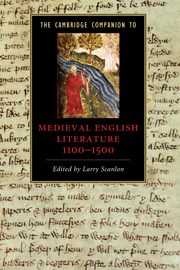10 - The Gawain-poet
from Part II - Authors
Published online by Cambridge University Press: 28 November 2009
Summary
Cleanness, one of two homilies attributed to the Gawain-poet, ends on a wild night of partying, spectral apparitions, and mayhem. Embellishing an episode from the Book of Daniel, Cleanness tells how King Belshazzar invites his own demise through his sacrilegious use of holy vessels and candelabra that his father, Nebuchadnezzar, plundered from the Temple of Jerusalem. Not only are we told about Solomon's holy vessels, as in the biblical Book of Daniel, but we are also shown them in a description of exceptional visual coherence. The gold cups are worked to resemble castles, with gilded turrets and pinnacles encrusted with parrots and flowers made of gems. The candlestick, so massive it must be brought in on a cart, is cast in gold in the shape of a tree, its branches filled with colorful birds. Like the vessels, the candlestick embodies spiritual, material, and aesthetic value. Its beauty is its truth and its truth its beauty. It is, that is, a symbolic object as well as a merely useful or beautiful one. Belshazzar's failure, his “uncleanness,” lies in his failure to see these relationships. He uses the vessels at a drunken party, and hence he dies.
Although Belshazzar makes a fatal error in his assessment of the power of sacred objects, he is correct in his appreciation of their beauty. Delight in the aesthetic qualities of things not only marks the account of holy vessels in Cleanness, but also characterizes descriptions of many types in all four of the poems that are normally identified as the work of the anonymous Gawain-poet. The four late-fourteenth-century poems of British Library Cotton Nero A.x., Cleanness , Pearl , Sir Gawain and the Green Knight , and Patience , the other homily, are generally believed to be the works of a single poet. This consideration is based partly on their compilation together in one manuscript copied by a single hand and illustrated by a single illuminator, but also on the predominance of shared themes and habits of style, among them long passages of descriptive enumeration that present, in great detail, in the surface textures of the pleasurable, and especially courtly, world.
- Type
- Chapter
- Information
- The Cambridge Companion to Medieval English Literature 1100–1500 , pp. 139 - 152Publisher: Cambridge University PressPrint publication year: 2009
- 1
- Cited by



